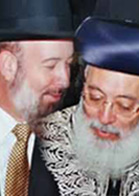The Chief Rabbinate

On May 23, Israel's chief rabbinate issued new regulations requiring prospective couples whose parents had been married by someone other than a rabbinate-approved rabbi to apply, along with their mothers, for a full inquiry into their Jewishness. The regulations provide for inquiries into the Jewishness of other couples as well. In the meantime, making deft use of its authority over conversions to Judaism, the rabbinate has acted to delegitimize other rabbis, in particular from the Modern Orthodox and Religious Zionist movements, as a whole.
Founded as a body that would help unify the modern Jewish state, the rabbinate (Hebrew: rabbanut) has evolved into something else entirely.
Under Ottoman rule, chief rabbis in Palestine served as the Jewish community's clerical representative to the authorities; at least in theory, they also headed rabbinical courts and other institutions. The new rabbinate, created in 1921 under the British, aimed to be different. The driving force behind it, and the first Ashkenazi chief rabbi, was Abraham Isaac Kook, an outstanding jurist, philosopher, and mystic. Seeing in Zionism the possibility of Jewish cultural and spiritual renaissance—even of redemption—he envisioned the rabbinate as a complement to the other emerging institutions of Jewish statehood, offering moral and spiritual guidance as well as a new "Sanhedrin" whose creative thinking would reinterpret Jewish law and tradition in dialogue with the problems and possibilities of modern life.
None of Kook's successors matched his vision and stature, though for decades they strove to ensure that the rabbinate would remain a broadly representative and responsive body. Over the years, some prescient voices, including the Orthodox thinkers Eliezer Berkovits and Yeshayahu Leibowitz, warned of the potential abuses and spiritual emptiness of state-sponsored religion. Recent chief rabbis have hardly been able to reach beyond their own particular social and ideological sectors.
By now, the utterly politicized rabbinate is the property of the ultra-Orthodox, for whom it is both a source of funds and patronage and a vehicle through which to wage ideological battle for the body and soul of Judaism—even as the ultra-Orthodox rank and file does not even recognize the institution's authority.
Two larger developments have heightened tensions. One is the growing reluctance of even religious women to submit to the strictures of ultra-Orthodoxy in issues of marriage and divorce, exacerbated by the rabbinate's correlative effort to interpret with greater stringency the laws regarding marital abuse, abandonment, and agunot. The other is the massive immigration to Israel of Soviet Jews, long estranged from organized Jewish life and in many cases not halakhically Jewish. The latter phenomenon has posed agonizing questions about the meaning of Jewish and Israeli identity, questions that for practical decision have nevertheless been left to rabbinate functionaries wholly unequipped to deal with them.
Institutional reform of the chief rabbinate is highly unlikely any time soon. The ultra-Orthodox political parties, Ashkenazi and Sephardi alike, show flexibility when it comes to matters of national import like borders and security so long as they are satisfied on what matters to them most: maintaining their institutional prerogatives and funding. Waves of anti-rabbinate sentiment have come and gone in Israeli politics, only to dissolve amid other concerns. Changing the situation, if it can be changed at all, may require a public that cares enough about Judaism to want to create—or dismantle—institutions in light of its own commitments and vision.
Comments are closed for this article.




